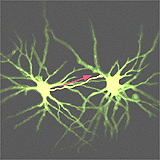Neurogenesis
 Until recently, any doctor would have told you that when you lose brain cells, you can never replace them. Scientists now know that the human brain has the ability to regenerate brain cells, or neurons, a process known as neurogenesis, in at least the hippocampus (used for memory) and olfactory bulb (used for smell).
Until recently, any doctor would have told you that when you lose brain cells, you can never replace them. Scientists now know that the human brain has the ability to regenerate brain cells, or neurons, a process known as neurogenesis, in at least the hippocampus (used for memory) and olfactory bulb (used for smell).
If your hippocampus isn't working right, you can't learn anything new or access recent memories. Damage to your hippocampus can make it impossible to create new memories (a condition called anterograde amnesia - Leonard Shelby's condition in the movie Memento) or remember what happened in the days or months before the accident. The hippocampus is also one of the first brain structures to be damaged by Alzheimer's Disease. That's why Alzheimer's first shows up as difficulty with recent memories, while memories of long-ago events remain intact until the disease is more advanced.
When your olfactory bulb stops replacing its cells, it's often a sign that there's something wrong with other parts of your brain, too. Loss of smell in old age can be a sign of Alzheimer's, perhaps because when the brain stops replacing olfactory cells it stops replacing cells in the hippocampus-based memory system as well. That's why one of the latest diagnostic tools for Alzheimer's is a scratch-and-sniff test.
About the Author
David Gamon, PhD
 Dr. David Gamon, one of the original writers at ScienceIQ, studied cognitive science at U.C. Berkeley, where he received his Ph.D. in Linguistics in 1997. He is the author of many popular books about the human brain, including Building Mental Muscle, Use It Or Lose It!, and Brains That Work a Little Bit Differently. His current projects include books about gender differences in the brain, the brain’s construction of sensory reality, and psychopathy.
Dr. David Gamon, one of the original writers at ScienceIQ, studied cognitive science at U.C. Berkeley, where he received his Ph.D. in Linguistics in 1997. He is the author of many popular books about the human brain, including Building Mental Muscle, Use It Or Lose It!, and Brains That Work a Little Bit Differently. His current projects include books about gender differences in the brain, the brain’s construction of sensory reality, and psychopathy.


